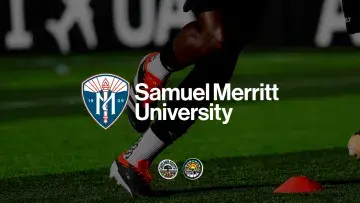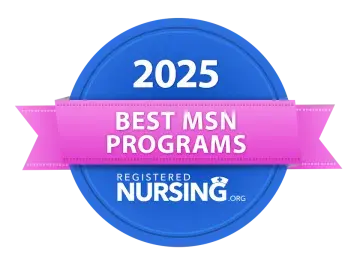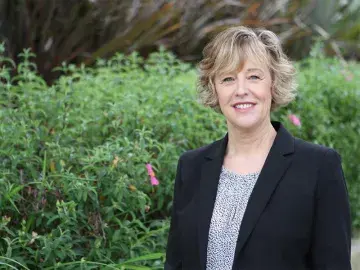Future Nurse Case Manager Wants to Heal Her Community
Profiles of Passion is a series of stories about SMU students and alumni who are demonstrating their dedication to transforming healthcare in their communities and the world. Click here for other stories in the series.
A hand drawing by Artesia Sanders laminated onto the cover of her laptop reveals a lot about what’s important to the Samuel Merritt University nursing student.
The artwork’s centerpiece is a profile of a proud and determined woman, with words printed onto her curly hair that include “independence,” “growth,” “family” and “son, my sun.” Next to her is a carefully drawn crown embedded with “Queen,” a nod to a recent honor Sanders received from the local court of the Shriners Foundation.
The drawing also mentions “Oakland,” the city where Sanders grew up and to which she remains deeply committed through her philanthropic work. In fact, Sanders’ family roots run so deep in Oakland that it is also home to many of her 55 first cousins.
“I know this community,” says Sanders. “My cohort teases me that there’s nowhere I go where people don’t know me.”
Though Sanders’ original career interest was graphic design, she is now a student in SMU’s Entry Level Master of Science in Nursing Case Management program. A series of life experiences drew her to healthcare.
After her best friend died in a car accident while Sanders was attending Auburn University in Alabama, Sanders returned to Oakland to work on providing workforce opportunities for people of color.
Her son was born with asthma in 2006 and hospitalized several times a year as a young child. “I couldn’t control my son’s health and it bothered me,” says Sanders.
Having a friend who was becoming a nurse inspired her to return to community college to take some prerequisite nursing courses. For a while she joined her mother, a longtime business analyst in the medical records division of a health organization, as a clinical liaison transitioning patients to follow-up care and then later as a case management coordinator.
Sanders’ career was put on hold when her grandmother — the matriarch of her large family —had a massive stroke in 2013 and never regained consciousness. The following year, her father was diagnosed with brain cancer that caused him to become blind so Sanders became his caregiver while working as a bartender on the weekends to make ends meet.
“My father had been an outdoorsman,” she says. “Seeing his body break down was hard.”
Right before her father died, he encouraged Sanders to finish what she started so the day after his burial she enrolled in a chemistry class. A cousin who attended SMU encouraged her to apply and she was accepted in 2016.
Despite her busy schedule of classes and raising a child, Sanders continues to devote time to raising money for charity as a member of the Shriners as well as a local African-American chapter of the Free Masons, a worldwide organization committed to community service.
Sanders’ dedication is motivated in part by the violence that has taken a toll on her community.
“I’m from East Oakland and there were times in high school when I could be talking to someone one day and the next day they’d be gone,” she says.
Sanders is also dismayed by the changes she sees happening in Oakland. She says rising rents and home prices are jeopardizing public health.
“Low-income housing is no longer available in Oakland,” she says. “Where are people going to go?”
Sanders is looking for solutions through her focus on community health.
She recently volunteered with Youth in Medicine, a free summer camp that exposes underserved youth to the health sciences, and was her nursing program’s point person at a health fair earlier this month at Oakland’s Allen Temple Baptist Church.
“Health education is how we can heal our community,” says Sanders, who hopes to one day develop a hub for medical case managers in Oakland that would help people manage their health and overcome barriers to seeking care.
“Because of her knowledge, vision and leadership qualities, Artesia has stepped in to make a difference at SMU and in the Oakland community,” says SMU Assistant Professor Marjorie Hammer. “I’m confident she will be a very successful nurse case manager because she is such an engaging and inspirational person.”
Sanders has recruited several black students to apply to SMU’s School of Nursing and wants to see others enter the field. That’s why she often posts photos of herself with her SMU classmates on Instagram and Facebook.
“I want people to see my black face doing a rigorous program and surviving,” says Sanders.


